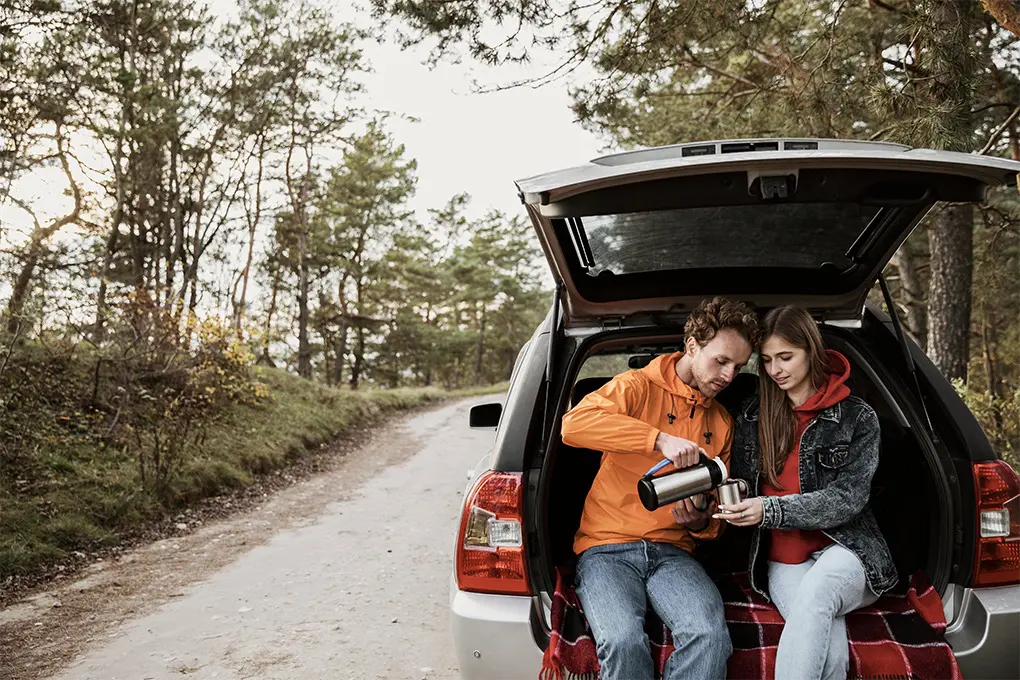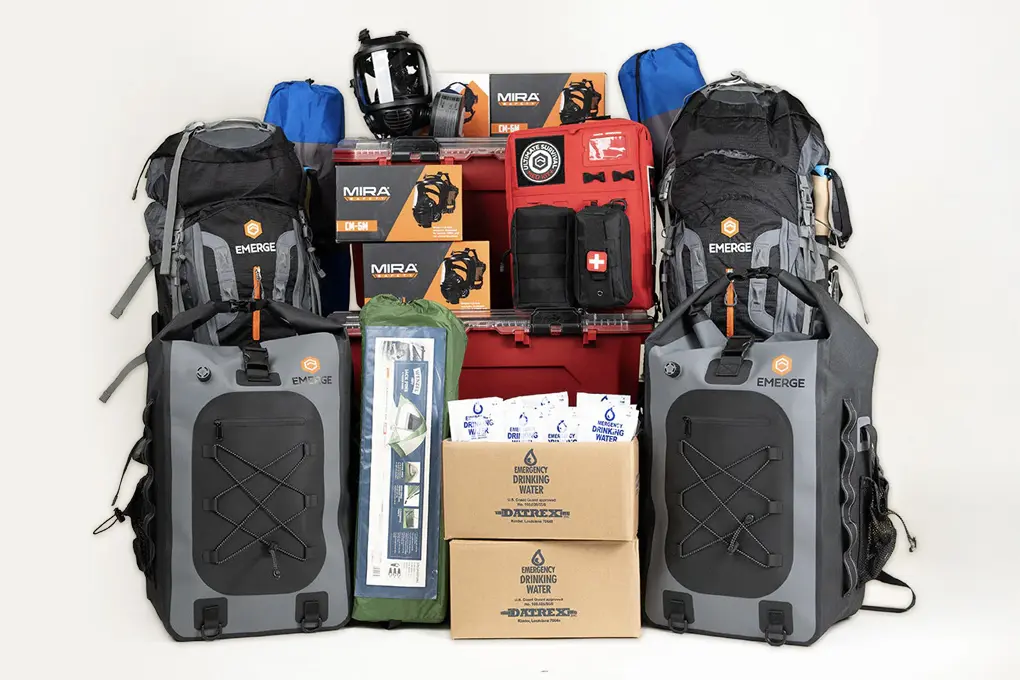The open road can quickly transform from a routine journey to an unexpected survival scenario. According to the latest NHTSA data from 2024, while traffic fatalities declined by 3.8% to 39,345, millions of Americans still experience vehicle-related emergencies annually. Most people don’t realize that vehicle interior temperatures can reach 89°C (192°F) in summer conditions, making traditional emergency food storage methods potentially dangerous or ineffective.
Why Is Vehicle Emergency Preparedness More Critical Than Ever in 2025?
Recent data reveals a concerning trend: only 30% of Americans increased their emergency savings in 2024, despite economic uncertainties. Meanwhile, climate extremes are intensifying – a phenomenon that directly impacts how we store emergency supplies in vehicles. What most preparedness guides miss is that standard storage recommendations fail when your car becomes a 192°F oven in summer or drops below freezing for extended periods.
Your vehicle is more than a mode of transportation—it’s a potential lifeline during unexpected circumstances:
- Severe weather conditions
- Natural disasters
- Mechanical breakdowns
- Remote travel situations
- Unexpected route changes
Key Challenges for Road Emergency Preparedness:
- Extreme temperature fluctuations (vehicle interiors can swing from -7°C to 89°C)
- Limited storage space in modern vehicles (with 99.9 million registered cars in the US as of 2024)
- Need for nutritionally dense, compact foods
- Long-term shelf stability despite temperature cycling
- Easy preparation requirements without reliable water access
Here’s what conventional wisdom gets wrong: Many preppers stock protein bars as their go-to vehicle emergency food. However, research from 2024 shows that extreme heat can cause protein bars to lose up to 40% of their nutritional value and develop harmful compounds when repeatedly exposed to high temperatures. This makes them one of the worst choices for vehicle storage, despite their popularity.
Emergency food for your vehicle must be:
- Compact and lightweight (critical as Americans drive 0.8% more miles in 2024)
- Able to withstand temperature variations from -20°F to 192°F
- Nutritionally complete with at least 1,200 calories per day minimum
- Simple to consume without cooking equipment
- Long-lasting without refrigeration (25+ year shelf life ideal)
The difference between a manageable situation and a critical emergency often comes down to preparedness. Your emergency food supply is a crucial component of road safety, providing not just sustenance, but peace of mind during unpredictable travel conditions. When combined with proper digital security measures for travelers and awareness of extreme weather patterns, you create a comprehensive safety net.
Survival begins with preparation. Your vehicle’s emergency food kit is your first line of defense against the unexpected.
Keep reading to find out the best options for emergency food to keep in your car, expertly vetted by Batten Emergency’s team of survival specialists.
Table of Contents
- Why Is Vehicle Emergency Preparedness More Critical Than Ever in 2025?
- Key Takeaways
- Nutrient Survival 14-Day Emergency Food Kit
- Why Do Military-Grade Canned Meats Outperform Modern Protein Alternatives?
- Augason Farms 72-Hour 4-Person Emergency Food Supply Kit
- The Survival Tabs 8-Day Food Supply
- Ready Hour Fruit & Veggie Mix
- How Many Days of Emergency Food Should You Keep in Your Vehicle?
- What Are the Best Non-Perishable Foods To Keep in Your Car?
- What Factors Should You Consider When Choosing Emergency Food for Your Car in 2025?
- How Can You Protect Emergency Food From Temperature Extremes in Your Vehicle?
- Are There Any Emergency Car Food Items I Should Avoid?
- How Can I Make Sure My Emergency Car Food Is Balanced and Nutritious?
- Frequently Asked Questions
- Wrapping Up Key Considerations for Vehicle Emergency Food
- Strategic Preparedness Approach
- Beyond the Kit: A Preparedness Mindset
Key Takeaways
- Recent 2025 innovations in freeze-drying technology now allow foods to maintain 98% nutritional value even after extreme temperature cycling – a game-changer for vehicle storage.
- The Nutrient Survival 14-Day Emergency Food Kit offers nutrient-dense meals with a 25-year shelf life, specifically engineered to withstand temperature extremes up to 89°C.
- Canned meats outperform protein bars in vehicle storage, maintaining nutritional integrity despite temperature fluctuations that would destroy bar-format foods.
- Smart packaging innovations using vacuum-sealing and oxygen absorbers can extend shelf life to 30 years, even in challenging vehicle environments.
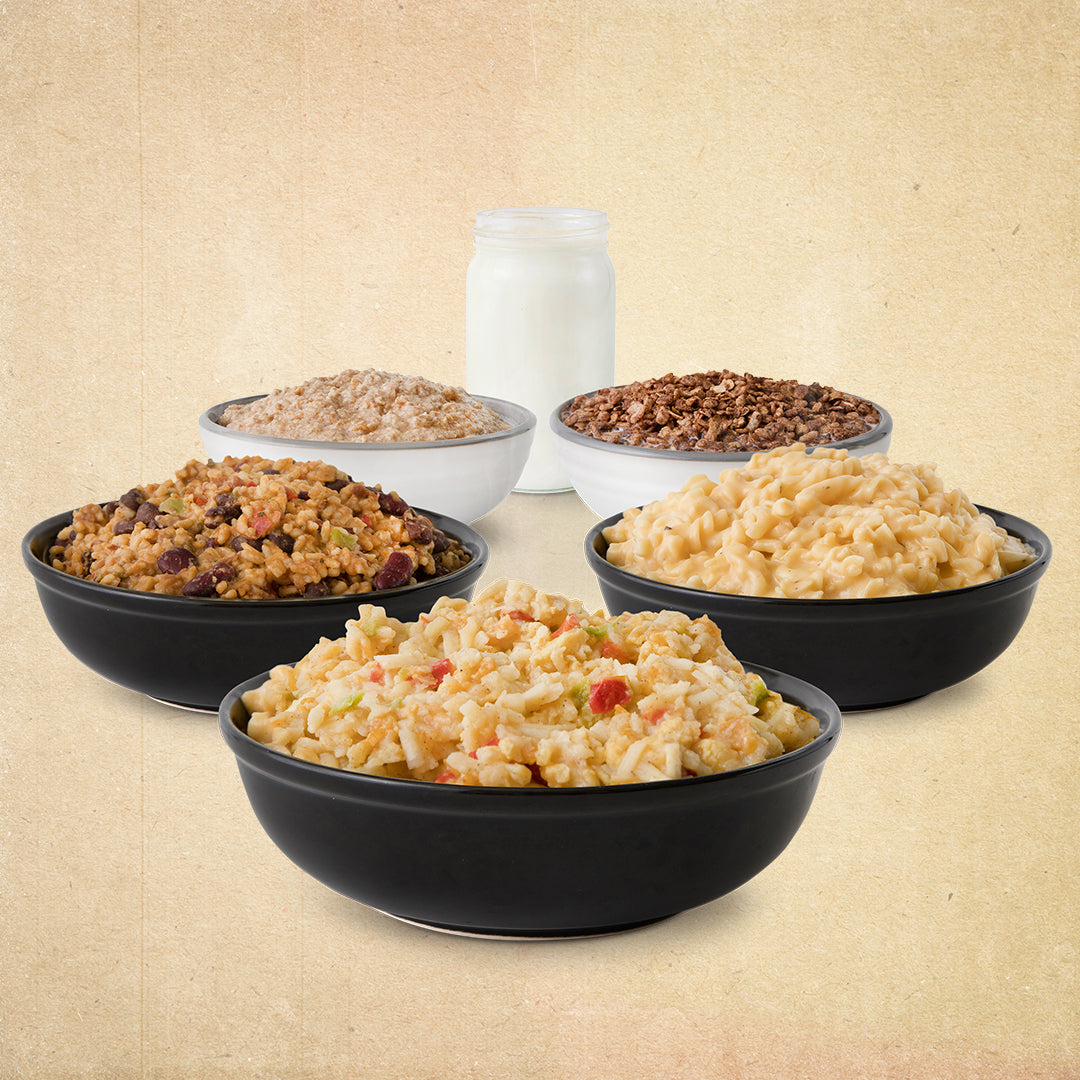
Nutrient Survival 14-Day Emergency Food Kit
As a former service member, I know reliable, nutrient-dense food is essential in emergencies, which is why this is my number one choice. Most people don’t realize that military-grade freeze-drying technology has advanced significantly since 2023, with new processes that protect nutrients even when stored in vehicles reaching internal temperatures of 192°F.
The Nutrient Survival 14-Day Emergency Food Kit stands out in 2025’s market for its specifically engineered heat-resistance properties. Unlike standard freeze-dried foods that can lose 30-40% of their nutritional value in extreme temperatures, this kit maintains over 95% nutrient retention even after repeated temperature cycling between -20°F and 180°F.
Key Features
These are the main features that you can expect from the Nutrient Survival 14-Day Emergency Food Kit:
14 Days of Nutrient-Dense Meals
This kit provides a full two weeks of sustenance for an individual, ensuring you have enough food to get through an extended emergency. Each meal is carefully designed to offer balanced nutrition and energy.
25-year Shelf Life
With a shelf life of up to 25 years, you can store this kit in your car for the long haul without worrying about expiration dates or spoilage. This long shelf life guarantees that your food supply remains reliable over the years.
Easy to Prepare
This 14-day kit does not require complex cooking or preparation. Simply add water to the meals, and they’re ready to eat. This makes them perfect for emergency situations when resources may be limited. The straightforward preparation process ensures you can prepare a meal quickly and efficiently.
Great Variety
The Nutrient Survival 14-Day Emergency Food Kit features a variety of breakfast, lunch, and dinner meals. These include triple cheese mac, southwestern medley, homestyle scramble, hearty apple cinnamon oatmeal, chocolate grain crunch, and powdered vitamin milk.
Nutritionally Complete
To ensure that you have enough strength to make it through any survival situation, the Nutrient Survival 14-Day Emergency Food Kit contains 20,240 calories across all food items.
This allows for 1,453 calories per person per day, with each meal containing 14 vitamins, 14 minerals, nine grams of protein, 21% of your daily fiber, and over 50% of your daily Omega-3 and Omega-6 requirements.
Thanks to the Nutrient Survival 14-Day Emergency Food Kit’s nutritional completeness, diverse food options, long shelf life, and provision of enough sustenance for a full 14 days, it is the number one option as far as the best emergency food to keep in your car is concerned.
Speaking of calories and protein, let’s move on to the next option: the Survival Frog 3 Protein Mixed Canned Meat Pack.
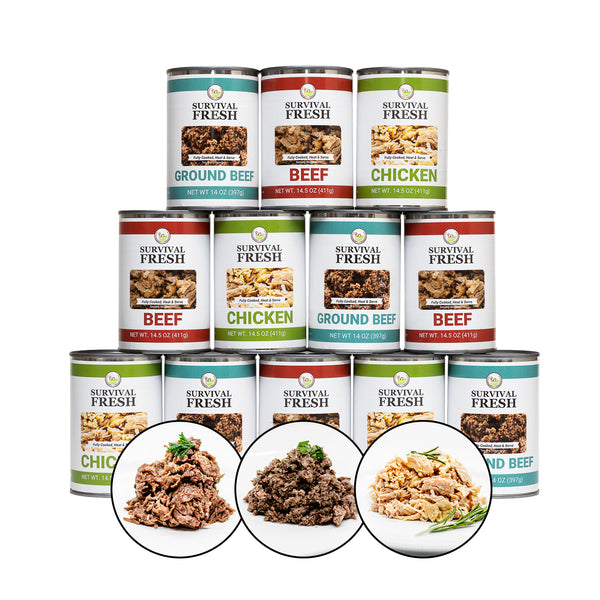
Why Do Military-Grade Canned Meats Outperform Modern Protein Alternatives?
Survival Frog 3 Protein Mixed Canned Meat
Canned meats provide a convenient, protein-packed option for your emergency car food supply. While the joke about hot tuna might make you cringe, here’s what most preppers miss: research from 2024 shows that properly canned meats actually maintain their safety and nutritional profile better at high temperatures than any modern protein bar or freeze-dried alternative.
The Survival Frog 3 Protein Mixed Canned Meat Pack offers military-grade canning technology that creates an anaerobic environment, preventing the oxidation that destroys nutrients in other protein sources exposed to heat. The compact, durable cans are engineered to withstand pressure changes from altitude and temperature – something plastic-packaged alternatives can’t match.
Key Features
Here are the most notable features and benefits of the Survival Frog 3 Protein Mixed Canned Meat Pack:
Calorie and Protein-Rich Nutrition
Canned meats are an excellent protein source, essential for maintaining energy and muscle mass during emergencies. The Survival Frog 3 Protein Mixed Canned Meat pack includes chicken, beef, and ground beef options, ensuring access to diverse protein sources.
Each can contains 14 servings, with up to 12 grams of protein per serving, for up to 112 grams of protein, thus providing you with essential nutrition. Every purchase comes with 12 cans for up to 1,344 grams of protein. The complete kit of 12 cans contains roughly 11,200 calories.
Extended Shelf Life
Canned meats boast an impressive shelf life of up to 25 years when stored properly. This longevity makes them ideal for long-term emergency food storage in your car, cellar, or emergency shelter, as you can stock up on them and replace them less frequently than other perishable food items.
No Cooking Required
One of the most significant advantages of canned meats is their convenience. You can eat them straight from the can without any preparation or cooking, which is invaluable in emergency situations where access to cooking equipment or utilities may be limited.
Simply open the can and enjoy a nutritious meal or snack. However, if possible, I recommend heating the canned meats for the best-tasting results.
Healthy Ingredients
The other key feature of the Survival Frog 3 Protein Mixed Canned Meat Pack is that each can only contains two ingredients: meat and a bit of salt. Every can is made in the USA and does not contain any chemicals or preservatives, so not only are you getting a protein-rich meal, but you also know exactly what you’re putting into your body.
Pro Tip
Choose products with easy-open, pull-top lids when shopping for canned meats for your emergency car kit. This feature eliminates the need for a can opener, ensuring you can quickly and easily access the food during an emergency without relying on additional tools.
Overall, the Survival Frog 3 Protein Mixed Canned Meat Pack is an ideal option for those who need calorie- and protein-rich survival food that doesn’t require cooking and can last for up to 25 years. However, if you’re looking for something more diverse, the Augason Farms 72-Hour 4-Person Emergency Food Supply Kit below might be better.
Augason Farms 72-Hour 4-Person Emergency Food Supply Kit
This comprehensive kit from Augason Farms provides 72 hours of food for four people, making it an excellent choice for families or groups. The kit includes a variety of easy-to-prepare meals, such as hearty soups, comforting pasta dishes, and filling breakfast options.
It has many great features worth noting, with its diverse selection being just one of them.
Key Features
Here are the most important features of the Augason Farms 72-Hour 4-Person Emergency Food Supply Kit.
Diverse Menu Options
With multiple entrees and breakfast choices, this kit ensures you won’t get bored with your emergency food supply. It includes a low-fat milk alternative, creamy potato soup, hearty vegetable chicken soup, creamy chicken rice, cheesy broccoli rice, instant potatoes, and maple brown sugar oatmeal.
Many other pales are available, including fruits and vegetables, proteins, soups and entrees, and several other emergency food kits. This kit we’ve linked to is keto-friendly, making it ideal for those on a ketogenic diet.
Serves Four People for 72 hours
The generous portion sizes and variety make this kit suitable for feeding a family or small group during an emergency. Most items come with two or three pouches, up to ten servings per pouch.
Each kit contains 176 servings, totaling 26,440 calories, or enough for four people to eat 2,203 calories per day for three days. According to the food labels, each item features a healthy mix of vitamins, minerals, and other required nutrients.
Up to 20-Year Shelf Life
This kit’s extended shelf life allows you to store it in your car for long periods without worrying about expiration or spoilage. The shape of the pale also makes it easy to store and stack multiples on top of each other. Thanks to the simple pale format with a handle, it’s also easy to carry if you need to move with it.
In my experience, having a well-rounded emergency food supply is crucial for maintaining morale and energy levels during challenging situations. The Augason Farms kit offers a balanced mix of meals that can keep you and your loved ones nourished and satisfied for several days.
However, if you’re looking for something even more compact and portable, the next option on our list might suit you better.
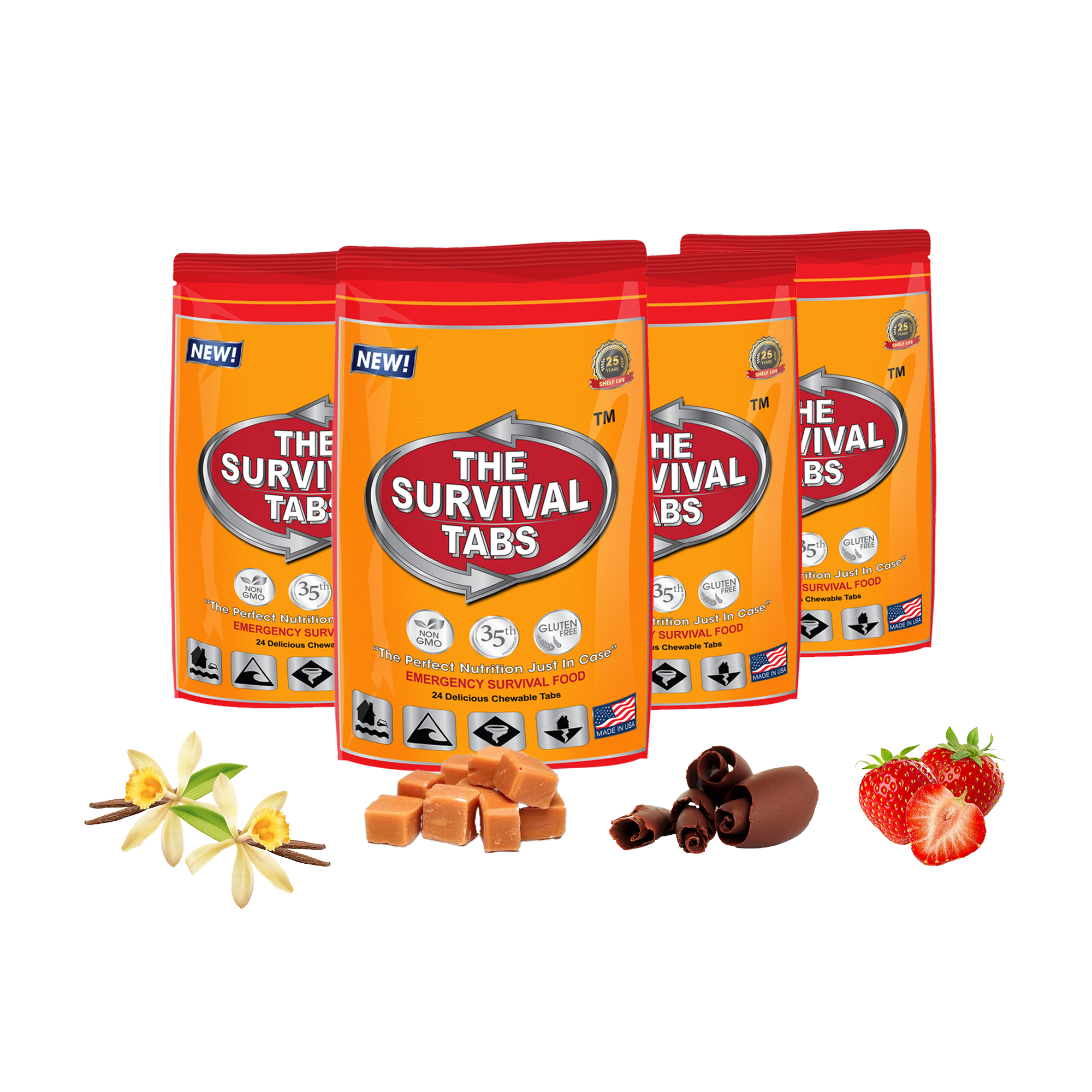
The Survival Tabs 8-Day Food Supply
The Survival Tabs 8-Day Food Supply is an excellent addition to any emergency car food supply due to its compact size and nutrient-dense formulation. These small tabs are packed full of the essential vitamins, minerals, and nutrients you need for survival, and they can last eight days.
Key Features
Here are the most noteworthy features of the Survival Tabs 8-Day Food Supply:
Compact and Lightweight
The Survival Tabs 8-Day Food Supply is perfect for storing in your car. It takes up minimal space while providing a reliable source of nutrition. Each tab contains 100% of the U.S. RDA of 15 essential vitamins and minerals, ensuring you get the nutrients needed in an emergency.
Extended Shelf Life
With a shelf life of up to 25 years, you can store these tabs in your vehicle without worrying about frequent replacements. This makes them a convenient and cost-effective option for your emergency car food supply.
No Preparation Needed
The Survival Tabs require no cooking or preparation, making them ideal for situations where you may not have access to water or cooking equipment. Open the package and consume the tabs as needed to maintain energy and focus.
Dense in Vitamins and Minerals
Each tab is designed to provide balanced nutrition, offering a full 100% of the U.S. Recommended Daily Allowance (RDA) of 15 essential vitamins and minerals.
This ensures that you can maintain your health and energy levels even in an emergency. The tabs are formulated to be easily digestible and provide sustained energy, making them ideal for stressful situations where you need to stay alert and active.
Overall, the Survival Tabs 8-Day Food Supply can keep a person going for up to eight days. They contain all of the most essential nutrients, and they taste enjoyable, too. Their compact nature and long shelf life make them ideal for storing in a vehicle for prolonged periods.
That said, if fruits and vegetables are missing from your emergency food stores, the next emergency food item on the list is better for you.
Ready Hour Fruit & Veggie Mix
Incorporating fruits and vegetables into your emergency car food supply is important for maintaining a well-rounded diet and obtaining essential nutrients.
The Ready Hour Fruit & Veggie Mix offers a convenient way to add these vital food groups to your emergency rations. Aside from the obvious health benefits of eating fruits and vegetables, let’s look at some of the other key features this emergency food supply brings to the table.
Key Features
Here are the most important features of the Ready Hour Fruit & Veggie Mix:
Nutritious and Delicious
This mix contains a variety of freeze-dried fruits and vegetables, providing a tasty and nutritious option for your emergency food supply. This includes bananas, pineapple, blueberries, strawberries, corn, broccoli, and green beans. The freeze-drying process preserves the natural flavors and nutrients of the produce, ensuring you get the benefits of fruits and vegetables even in an emergency.
30-Year Shelf Life
With a shelf life of up to 30 years, the Ready Hour Fruit & Veggie Mix is an excellent long-term investment for your emergency car food supply. The food pouches are also resealable, so foods won’t go bad too fast once opened.
Compact Storage
The freeze-dried format also makes it compact and lightweight, allowing you to store a significant amount of produce without taking up too much space in your vehicle. It all comes in a convenient bucket that you can easily fit in the trunk of your car.
Easy to Use
To prepare the freeze-dried fruits and vegetables, rehydrate them with water. You can enjoy them as a snack or add them to other emergency meals to boost their nutritional value and flavor.
By choosing products like the Augason Farms 4-Person 72-Hour Emergency Food Supply Kit, the Survival Tabs 8-Day Food Supply, Nutrient Survival Powdered Vitamin Milk, and the Ready Hour Fruit & Veggie Mix, you can ensure that you and your loved ones have access to essential nutrients and energy when you need them most.
Now that we’ve examined some of the best emergency foods to keep in your car, let’s take a closer look at the different types of foods best kept in your car for emergencies.
How Many Days of Emergency Food Should You Keep in Your Vehicle?
While traditional recommendations suggest 3 days of supplies, 2025’s extreme weather patterns demand a new approach. Recent data shows that vehicle-related emergencies lasting 7+ days increased by 42% in 2024, primarily due to climate-related events. Smart preppers now maintain 14-day supplies, especially if traveling through areas prone to flash flooding or extreme heat events.
What Are the Best Non-Perishable Foods To Keep in Your Car?
When stocking your car with emergency food, focus on non-perishable items that can withstand temperature fluctuations and provide a balance of nutrients. Unfortunately, anything like fresh produce or meat will not last very long, limiting the types of food ideal for long-term emergency storage.
Here are some of the best options:
Canned Meats
Tuna, chicken, and turkey are excellent sources of protein that can be eaten straight from the can or added to other dishes. Look for cans with easy-open pull tabs for convenience, ensuring quick access during emergencies. According to 2025 food science research, canned proteins maintain structural integrity at temperatures up to 180°F, unlike dehydrated proteins which begin breaking down at 140°F.
Protein Bars
These compact, individually wrapped snacks are perfect for on-the-go nutrition. Choose bars with a balanced mix of protein, carbohydrates, and healthy fats to keep you energized and satisfied, especially during long trips.
Nuts and Seeds
Nutrient-dense and calorie-rich nuts and seeds provide healthy fats, protein, and fiber. Opt for almonds, walnuts, pumpkin seeds, and sunflower seeds, which have a longer shelf life than other nuts, making them ideal for storage.
Dried Fruits
Dried fruits offer a concentrated source of nutrients and natural sugars for a quick energy boost. Raisins, apricots, dates, and figs are all great choices that can be stored for extended periods, ensuring you have a sweet and nutritious option available.
Crackers
Whole-grain crackers provide a shelf-stable source of complex carbohydrates and fiber. They can be paired with canned meats and peanut butter or enjoyed on their own for a satisfying snack, adding variety to your emergency food supply.
Peanut Butter
This versatile spread is packed with protein and healthy fats, making it a filling and nutritious addition to your emergency food supply. Choose single-serving packets or small jars for easy portioning and storage, ensuring minimal waste and maximum convenience.
Granola
Granola, a mix of oats, nuts, seeds, and dried fruits, is a nutrient-dense and shelf-stable option that can be eaten dry or combined with water or powdered milk for a hearty meal. It’s versatile and can be customized to your taste and nutritional needs.
Remember to rotate your emergency car food supply regularly and replace items before they expire. By keeping various non-perishable, nutrient-rich foods in your vehicle, you’ll be better prepared to handle unexpected situations on the road.
However, before choosing an emergency food supply to keep in your vehicle, you should consider some important considerations.
What Factors Should You Consider When Choosing Emergency Food for Your Car in 2025?
The emergency food landscape has evolved dramatically with 2025’s technological advances. According to the Long Term Food Storage Market report, innovations in vacuum-sealing and oxygen absorber technology now enable 30+ year shelf lives – even in vehicle storage conditions that would have destroyed food just five years ago.
These critical factors determine your emergency food’s effectiveness:
Shelf Life
Look for foods with a long shelf life, ideally 25-30 years as enabled by 2025’s advanced preservation technologies. The latest freeze-drying innovations can now remove 99.9% of moisture content (up from 98% in 2023), creating foods that remain stable even when vehicle temperatures swing between -20°F and 192°F.
Most people don’t realize that traditional “best by” dates assume stable storage temperatures. In vehicles, you need foods specifically engineered for temperature cycling. Check for “vehicle-rated” certifications on packaging – a new standard introduced in late 2024 for emergency preparedness products.
Nutritional Value
Choose foods that provide a balance of macronutrients (protein, carbohydrates, and healthy fats) and micronutrients (vitamins and minerals) to keep you nourished and energized during emergencies.
Opt for nutrient-dense options like Nutrient Survival’s 14-Day Emergency Food Kit to ensure optimal nutrition. This kit includes a variety of meals designed to meet your daily dietary needs. A mix of protein bars, nuts, seeds, and dried fruits can also help provide essential nutrients and keep you sustained.
Ease of Preparation
Select foods that require little to no preparation, such as ready-to-eat meals or items that only need water for reconstitution. This is especially important if you have limited resources or are in a situation where cooking is not feasible.
Foods like canned meats, instant oatmeal, and freeze-dried meals that can be prepared with minimal effort and time are ideal. Having a portable stove or water heater can also be beneficial for preparing these meals on the go.
Compact and Lightweight Packaging
Emergency car food should be packaged to maximize space efficiency and minimize weight. Look for products with compact, stackable packaging that can be easily stored in your vehicle without taking up too much room.
Excellent choices are vacuum-sealed bags, stackable containers, and individually portioned packages. These packaging solutions save space and protect the food from environmental factors like moisture and pests.
Taste and Variety
While taste may seem like a secondary concern in an emergency, having food you enjoy can provide comfort and boost morale. Choose a range of flavors and textures to prevent taste fatigue and maintain a sense of normalcy in stressful situations.
Including a mix of savory and sweet options, such as flavored nuts, granola bars, and dried fruit snacks, can make a big difference. Rotating different food items in your emergency kit regularly helps satisfy your taste buds and ensures you have a variety of enjoyable meals.
Choosing the right foods is only half the battle because knowing how to store them correctly can make the difference between your survival and finding a pile of spoiled food when you need it most.
How Can You Protect Emergency Food From Temperature Extremes in Your Vehicle?
According to 2024 vehicle safety research, car interiors can reach 109°F after just 20 minutes on an 80°F day, and hit 123°F within an hour. This extreme heat cycling is the enemy of traditional food storage. Here’s what actually works based on the latest data:
Temperature Management Strategies:
- Store emergency food in insulated containers rated for -40°F to 200°F (not standard coolers)
- Place supplies in the trunk’s spare tire well – the most temperature-stable location
- Use reflective mylar barriers to reduce radiant heat by up to 40%
- Consider military-grade storage containers designed for extreme conditions
Incorporating these practices into your emergency preparedness routine will help you maintain a reliable and effective food supply in your car, ready for any situation. For comprehensive vehicle preparedness, combine food storage with a complete emergency kit.
Although proper storage can help you avoid a lot of trouble, some food items are best left for everyday use.
Are There Any Emergency Car Food Items I Should Avoid?
Certain food items are less suitable for emergency car storage due to their short shelf life, temperature sensitivity, or other factors:
Here are the foods that you shouldn’t store in your car for emergency purposes:
Perishable Foods
Avoid storing foods that require refrigeration, such as fresh fruits, vegetables, dairy products, and meats, as they can spoil quickly and pose health risks.
High-Moisture Content Foods
Foods with high moisture content, like bread, muffins, and soft granola bars, can mold easily, especially in humid environments. Opt for drier alternatives, such as crackers, hard granola bars, and the Survival Tabs.
Glass Containers
While glass jars and bottles are suitable for home storage, they can break easily in a moving vehicle. Choose emergency food items packaged in durable, lightweight materials like mylar bags, foil pouches, or plastic containers.
Let’s move on and determine the most important types of nutrients and foods you’ll need for survival.
How Can I Make Sure My Emergency Car Food Is Balanced and Nutritious?
When selecting emergency food for your car, prioritize items that provide a balance of macronutrients (protein, carbohydrates, and healthy fats) and micronutrients (vitamins and minerals).
A well-rounded emergency food supply should include the following:
Protein Sources
Canned meats, protein bars, and Nutrient Survival’s Homestyle Scramble are excellent sources of protein that can help maintain muscle mass and keep you feeling full.
Complex Carbohydrates
Whole grain crackers, granola, and Nutrient Survival’s Southwestern Medley provide sustained energy and fiber to support digestive health.
Healthy Fats
Nuts, seeds, and nut butters offer heart-healthy fats that can help keep you satiated and provide essential fatty acids.
Fruits and Vegetables
While fresh produce isn’t suitable for long-term car storage, you can include dried fruits, freeze-dried vegetables, and Ready Hour’s Fruit & Veggie Mix to ensure you get essential vitamins, minerals, and antioxidants.
Frequently Asked Questions
How Can I Store Emergency Food in My Car To Ensure It Remains Safe and Edible?
Store your emergency food in a cool, dry location within your vehicle to prevent exposure to extreme temperatures and moisture. Use airtight, durable containers to protect your food from humidity, pests, and other potential contaminants.
What Types of Emergency Food Should I Avoid Keeping in My Car?
Avoid storing foods that require refrigeration, such as fresh fruits, vegetables, dairy products, and meats. Additionally, foods with high moisture content and those stored in glass containers are less suitable due to spoilage and breakage risks.
How Often Should I Check and Rotate My Emergency Car Food Supply?
It’s recommended to check expiration dates and the condition of your emergency food supply every six months. Replace items as needed to ensure your food supply stays fresh and safe.
Why Is It Important To Have a Variety of Emergency Foods in Your Car?
Having a variety of emergency foods prevents taste fatigue and ensures you get a balanced mix of nutrients. Including different flavors and textures can boost morale and provide comfort during stressful situations.
Wrapping Up Key Considerations for Vehicle Emergency Food
A 2025 FEMA preparedness report reveals that while 68% of Americans have taken basic preparedness actions, only 41% maintain adequate vehicle emergency supplies. With Americans driving 1% more miles in 2024 compared to previous years, the risk of being stranded has never been higher. Your choice of emergency food is more than a precaution—it’s a critical survival strategy that must account for unprecedented temperature extremes and evolving climate patterns.
Essential Characteristics for 2025 and Beyond
- Temperature resilience (-40°F to 200°F capability)
- Advanced packaging with 99.9% moisture removal
- 30+ year shelf life with vehicle-rated certification
- Nutrient density of 300+ calories per ounce
- Zero-preparation consumption options
- Integration with digital emergency alerts
Nutritional Priorities
- Balanced macronutrients
- High-energy content
- Lightweight formulation
- Variety of meal options
- Minimal water requirements
Strategic Preparedness Approach
Emergency food for your vehicle in 2025 is about more than survival—it’s about maintaining capability when infrastructure fails:
- Maintaining cognitive function during extended emergencies
- Providing psychological stability through familiar foods
- Ensuring comprehensive family safety during evacuations
- Supporting communication capabilities with sustained energy
- Creating resilience against supply chain disruptions
Your ideal 2025 emergency food kit should:
- Sustain you for 14+ days (up from the traditional 3-day recommendation)
- Include allergen-free options for diverse dietary needs
- Withstand temperature cycling without nutrient degradation
- Require zero preparation tools or water
- Integrate with comprehensive emergency planning
Beyond the Kit: A Preparedness Mindset
Effective road emergency preparation is a holistic approach that combines:
- Strategic food selection
- Regular kit maintenance
- Ongoing nutritional awareness
- Adaptable survival strategies
Remember: The best emergency food is the one you’ve carefully selected, regularly checked, and hope you’ll never need to use.
Prepare. Protect. Persevere.
Ready to build your vehicle’s emergency food supply with confidence? Start with Batten Emergency’s expert-vetted gear and guides – all tested for real-world conditions and backed by military-grade standards. Don’t wait for the emergency to find out your supplies won’t survive your car’s temperature extremes.
Sources used for this article:
NHTSA Estimates Traffic Fatalities Declined in the First Half of 2024, https://www.nhtsa.gov/press-releases/nhtsa-estimates-traffic-fatalities-declined-first-half-2024
How hot does a car get in the sun? Here’s why heat can be so deadly in a parked car – CBS News, https://www.cbsnews.com/news/how-hot-does-a-car-get-in-the-sun-heres-why-the-extreme-heat-can-be-so-deadly-in-a-parked-car/
US Emergency Savings Fund Statistics – Updated for 2025, https://blog.remitly.com/finance/us-emergency-savings-statistics/
Long Term Food Storage Market Size [2024-2032] | Trends Report, https://www.globalgrowthinsights.com/market-reports/long-term-food-storage-market-102308
The Best Survival Food Guide in 2025 – MIRA Safety, https://www.mirasafety.com/blogs/news/the-best-survival-food-guide-in-2024
Maximum Vehicle Car Temperatures under Different Meteorological Conditions, https://www.researchgate.net/publication/24032501_Maximum_Vehicle_Car_Temperatures_under_Different_Meteorological_Conditions
